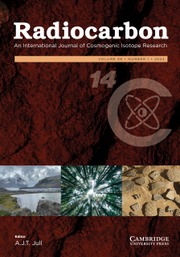Crossref Citations
This article has been cited by the following publications. This list is generated based on data provided by Crossref.
Barker, Harold
and
Mackey, John
1963.
British Museum Natural Radiocarbon Measurements IV.
Radiocarbon,
Vol. 5,
Issue. ,
p.
104.
KNOX, R.
1963.
DETECTION OF IRON CARBIDE STRUCTURE IN THE OXIDE REMAINS OF ANCIENT STEEL.
Archaeometry,
Vol. 6,
Issue. 1,
p.
43.
Hurt, Wesley R.
1964.
Recent Radiocarbon Dates for Central and Southern Brazil.
American Antiquity,
Vol. 30,
Issue. 1,
p.
25.
Agrawal, D. P.
Kusumgar, S.
Lal, D.
and
Sarna, R. P.
1964.
Tata Institute Radiocarbon Date List II.
Radiocarbon,
Vol. 6,
Issue. ,
p.
226.
Speiser, E. A.
1964.
The Syllabic Transcription of Ugaritic [h] and [ḥ].
Bulletin of the American Schools of Oriental Research,
Vol. 175,
Issue. ,
p.
42.
Sigalove, Joel J.
and
Long, Austin
1964.
Smithsonian Institution Radiocarbon Measurements I.
Radiocarbon,
Vol. 6,
Issue. ,
p.
182.
Agrawal, D. P.
1964.
Harappa Culture: New Evidence for a Shorter Chronology.
Science,
Vol. 143,
Issue. 3609,
p.
950.
Oeschger, H.
and
Riesen, T.
1965.
Bern Radiocarbon Dates IV.
Radiocarbon,
Vol. 7,
Issue. ,
p.
1.
Stuckenrath, Robert
and
Ralph, Elizabeth K.
1965.
University of Pennsylvania Radiocarbon Dates VIII.
Radiocarbon,
Vol. 7,
Issue. ,
p.
187.
Stuckenrath, Robert
1967.
University of Pennsylvania Radiocarbon Dates X.
Radiocarbon,
Vol. 9,
Issue. ,
p.
333.
Hubbs, Carl L.
and
Bien, George S.
1967.
La Jolla Natural Radiocarbon Meaurements V.
Radiocarbon,
Vol. 9,
Issue. ,
p.
261.
Barker, Harold
and
Mackey, John
1968.
British Museum Natural Radiocarbon Measurements V.
Radiocarbon,
Vol. 10,
Issue. 1,
p.
1.
Tauber, Henrik
1968.
Copenhagen Radiocarbon Dates IX.
Radiocarbon,
Vol. 10,
Issue. 2,
p.
295.
Alessio, M.
Bella, F.
Cortesi, C.
and
Turi, B.
1969.
University of Rome Carbon-14 Dates VII.
Radiocarbon,
Vol. 11,
Issue. 2,
p.
482.
Stuckenrath, Robert
and
Lawn, Barbara
1969.
University of Pennsylvania Radiocarbon Dates XI.
Radiocarbon,
Vol. 11,
Issue. 01,
p.
150.
Barker, Harold
Burleigh, Richard
and
Meeks, Nigel
1969.
British Museum Natural Radiocarbon Measurements VI.
Radiocarbon,
Vol. 11,
Issue. 2,
p.
278.
Lawn, Barbara
1970.
University of Pennsylvania Radiocarbon Dates XIII.
Radiocarbon,
Vol. 12,
Issue. 2,
p.
577.
Waterbolk, H. T.
1971.
Working with Radiocarbon Dates.
Proceedings of the Prehistoric Society,
Vol. 37,
Issue. 2,
p.
15.
Stuckenrath, Robert
and
Mielke, James E.
1972.
Smithsonian Institution Radiocarbon Measurements VII.
Radiocarbon,
Vol. 14,
Issue. 2,
p.
401.
Crane, H. R.
and
Griffin, James B.
1972.
University of Michigan Radiocarbon Dates XIV.
Radiocarbon,
Vol. 14,
Issue. 1,
p.
155.


